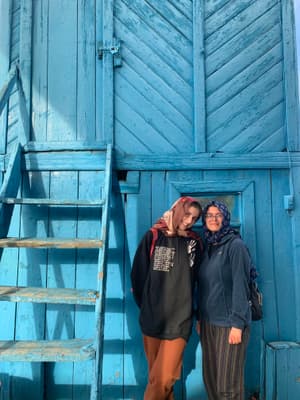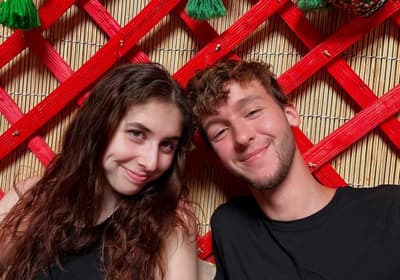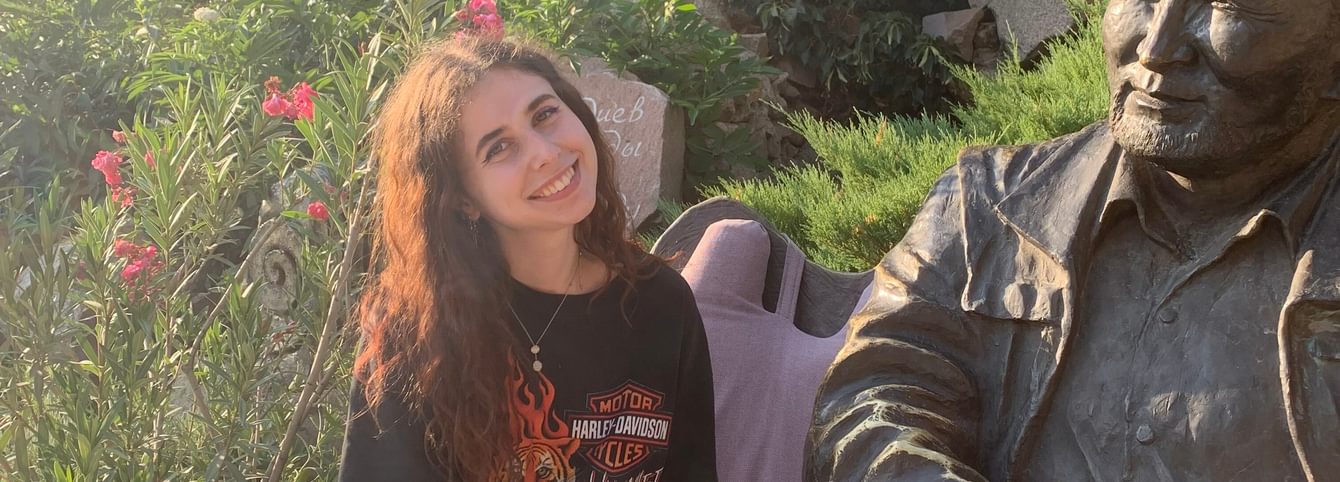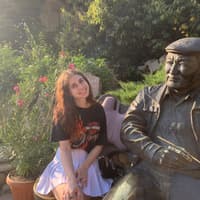Bianca Visekruna
Bianca Visekruna is an alumna of the 2022 CLS Russian program hosted by American University of Central Asia in Bishkek, Kyrgyzstan. Bianca is a senior at Portland State University’s School of Business Honors College majoring in Management and Leadership with a certificate in Entrepreneurship. Bianca aspires to work in project management or consulting in the fashion industry using her language and cultural savvy to contribute to international business and fashion.
Getting to Know Bianca
I was born and raised in Portland, Oregon to refugees from former Yugoslavia. I grew up in a typical Balkan household (think: loud, chaotic, food-centered, did I mention loud?) but in a multicultural neighborhood. My mom would make uštipci and burek and we would often shop at the local Thai specialty store and get deli meats from the local Eastern European grocery store. Speaking a Slavic language when out with my family often led us to being mistaken for Russians, which got me interested in studying the similarities between Balkan languages and Russian.
My identity definitely played a role in choosing Russian as my target language. Outside of language learning, I’m a deeply family-oriented person, a bookworm, and constantly researching fashion designers and the newest haute couture collections. If I’m not curled up at home reading or playing an RPG with my brother, I can often be found racing down ski slopes with my dad or getting boba with friends.
Why Russian?
Throughout my adolescence, I was most often best friends with people from Russian families. Coming from a Slavic household, I felt the most seen and understood by other Slavic people and their families. When I discovered NSLI-Y my senior year of high school, I did not hesitate to apply to Russian. Not only is the culture so familiar to me, but with my native tongue (Bosnian) already being so similar to Russian, I felt like I had no excuse not to learn the language.
Friendships Sweeter than Honey
One of my favorite memories from Kyrgyzstan has to be our cohort’s trip to Issyk Kul. We stayed in a couple of towns surrounding the giant lake and spent the weekend swimming, visiting cultural landmarks, and stocking up on souvenirs and gifts for friends and family back home. Admiring the passing landscape through our tour bus windows, playing games to pass the time, and buying up a tiny village’s supply of fresh honey, were some of my favorite bonding moments with my cohort. This trip not only made me fall even more in love with Kyrgyzstan and all of its natural beauty, but it made me realize how cohesive and close our cohort had become over the course of the program. I’m so deeply grateful for the relationships I built on program, especially with my fellow Americans.

Bringing Stories Back Home
During my CLS Program in Kyrgyzstan, I showed that not all Americans come from a lineage of Americans. I come from a family that came to the U.S. as refugees. Additionally, my cohort as a whole showed Kyrgyz people that we were there to learn more about them and learn their language. We did not come to spread our own beliefs or change them to be more like us. We portrayed ourselves more as curious and patient students, ready to immerse ourselves into Kyrgyz culture and adapt to it.
Honestly, I did not shut up about Kyrgyzstan for a solid three months post-program. I was completely moved by the warmth and hospitality of the Kyrgyz people. Absolutely every relative and friend of mine had to sit through my CLS spiel where I detailed everything from the interactions to the food, to the hilarious lost-in-translation moments. I shared with friends and family the uniqueness of Kyrgyz people and Kyrgyzstan as a country. I was fascinated by the amalgam of Slavic, Central Asian, and Turkic influences that I experienced while abroad, and I couldn’t help but share endless stories.
Connecting to Central Asia & Eastern Europe
Russian culture isn’t limited to just Russia the country; this language and culture are intertwined with that of a dozen Central Asian and Eastern European countries. Being able to speak Russian allowed me to connect with Central Asian people and their culture on a level much deeper than if I had just stuck to using English. Knowing Russian opens up a whole world of travel. Before CLS, I didn’t realize how often Russian would come in handy when traveling. If you want to explore countries that are rich with culture, history, gorgeous landscapes, and delicious food, it doesn’t hurt to pick up some Russian.

Being a Vegetarian in Kyrgyzstan
As a vegetarian in Kyrgyzstan, I was often offered chicken and my reasoning for vegetarianism was naturally questioned. I approached this with as much flexibility and understanding as I could. Going into CLS, I could’ve viewed my dietary restrictions as a problem but instead, I viewed it as an opportunity. While immersing myself in a culture that prides itself on a meat-heavy diet, I found myself seeking out and trying dozens of interesting (and delicious) meat-free options, both from Russian and Dungan cuisine. I had the opportunity to explain my reasoning for vegetarianism, and I showed Kyrgyz people that it’s actually more common in America than they might’ve imagined.
Words of Advice
Throwing ourselves into uncomfortable and unfamiliar situations is exactly how we learn and grow as humans. We are taught from a young age that ambiguity and feeling lost are uncomfortable, bad feelings. CLS taught me exactly the opposite; we cannot grow if we are comfortable. Intensive study abroad is not easy, but that challenge is exactly why it’s so life-changing.



